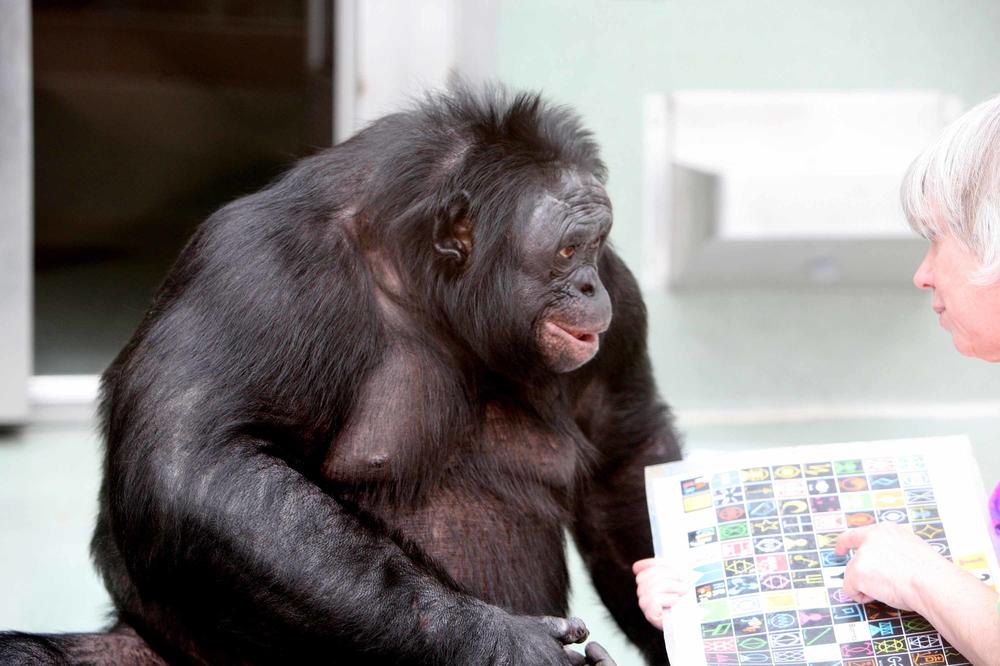What Do “Bouba” and “Kiki” Mean to a Bonobo?
International team of researchers with members from Freie Universität Berlin examines the fundamentals of language development
May 27, 2022
“Kanzi,” the bonobo, can communicate using different symbols.
Image Credit: Wikipedia - William H. Calvin, PhD - Creative Commons - Attribution-Share Alike 4.0 International
In the United States the male bonobo, “Kanzi,” drew the attention of researchers due to his ability to learn English words and match spoken words with images of objects – a basic ability required for language acquisition. Researchers from Europe and the United States have now conducted a linguistic experiment on “sound symbolism” with the great ape. The team included experts from Freie Universität Berlin, the University of St. Andrews, and the Max Planck Institute for Evolutionary Anthropology, as well as Pennsylvania State University and the Ape Initiative USA.
“Kiki” and “Takete” Sound Pointy or Sharp
“In human language, the connection between a word, a written signifier, and that which it signifies is usually arbitrary. The meaning of a word usually has nothing to do with the sound of the word – but there are exceptions,” says Friedemann Pulvermüller, a professor of neuroscience at Freie Universität Berlin, who works on the neuroscience of language and pragmatics in the Brain Language Laboratory. Humans tend to associate the sound of pseudowords with certain shapes, explains Pulvermüller, who co-authored the study.
Sounds like “bouba” or “maluma” tend to be matched with curved shapes, while “kiki” or “takete” were often matched with pointy or angular shapes. This connection between sounds and abstract symbols is known as “sound symbolism.” Previous studies have shown that speakers of different languages from across cultures share this tendency to map sounds and shapes. The theory is that sound symbolism was key to the early development of spoken language in humans, and this is known as the “bouba-kiki effect.”
Apes Fail to Connect Sounds and Shapes
In the experiment, researchers would play nonsense syllables, for example “kiki” or “bouba,” for Kanzi and show the ape various abstract shapes that were either angular or curved. Unlike humans, he did not demonstrate a tendency to match sharp sounds (like “kiki”) with angular shapes or round sounds (like “bouba”) with curved shapes. Bonobos are not the only apes that fail to make this connection. Scientists have long assumed that sound symbolism might be an indication of a kind of implicit knowledge that was important to the evolution of human speech.
Kanzi’s understanding of language is, however, otherwise very strong. He was able to learn how to communicate with humans using hundreds of different symbols, called lexigrams. The great ape can differentiate between English words and identify objects that correspond to the words on a touchscreen.
The Bouba-Kiki Effect Helps Us Understand the Origins of Language
The findings indicate that a highly developed, intuitive understanding of sound-symbol associations is a unique quality among humans. This ability likely played a significant role in the emergence of protowords – an important step in the evolutionary history of speech. However, the experiment did not establish any substantial conclusions about apes’ language abilities, says Pulvermüller.
“Bonobos might indeed be able to perceive other sound-symbol associations, for example between low frequency sounds and larger objects,” Pulvermüller notes. According to him, the study nevertheless advanced scientists’ knowledge of fundamental speech phenomena, such as the bouba-kiki effect, and gave insights into the evolution of human language.
This article originally appeared in German on May 8, 2022, in the Tagesspiegel newspaper supplement published by Freie Universität Berlin.
Further Information
Prof. Dr. Dr. Friedemann Pulvermüller, Freie Universität Berlin, Brain Language Laboratory, Email: friedemann.pulvermuller@fu-berlin.de

